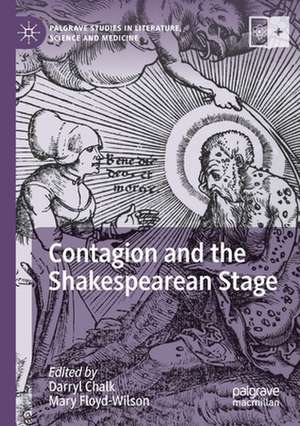Contagion and the Shakespearean Stage: Palgrave Studies in Literature, Science and Medicine
Editat de Darryl Chalk, Mary Floyd-Wilsonen Limba Engleză Paperback – 14 aug 2020
This collection of essays considers what constituted contagion in the minds of early moderns in the absence of modern germ theory. In a wide range of essays focused on early modern drama and the culture of theater, contributors explore how ideas of contagion not only inform representations of the senses (such as smell and touch) and emotions (such as disgust, pity, and shame) but also shape how people understood belief, narrative, and political agency. Epidemic thinking was not limited to medical inquiry or the narrow study of a particular disease. Shakespeare, Thomas Middleton, Ben Jonson, Thomas Dekker and other early modern writers understood that someone might be infected or transformed by the presence of others, through various kinds of exchange, or if exposed to certain ideas, practices, or environmental conditions. The discourse and concept of contagion provides a lens for understanding early modern theatrical performance, dramatic plots, and theater-going itself.
| Toate formatele și edițiile | Preț | Express |
|---|---|---|
| Paperback (1) | 780.68 lei 6-8 săpt. | |
| Springer International Publishing – 14 aug 2020 | 780.68 lei 6-8 săpt. | |
| Hardback (1) | 784.61 lei 6-8 săpt. | |
| Springer International Publishing – 28 iun 2019 | 784.61 lei 6-8 săpt. |
Din seria Palgrave Studies in Literature, Science and Medicine
- 20%
 Preț: 628.35 lei
Preț: 628.35 lei - 15%
 Preț: 699.12 lei
Preț: 699.12 lei - 15%
 Preț: 521.26 lei
Preț: 521.26 lei - 15%
 Preț: 700.10 lei
Preț: 700.10 lei - 15%
 Preț: 642.68 lei
Preț: 642.68 lei - 15%
 Preț: 588.37 lei
Preț: 588.37 lei - 15%
 Preț: 643.84 lei
Preț: 643.84 lei - 15%
 Preț: 698.80 lei
Preț: 698.80 lei - 15%
 Preț: 523.54 lei
Preț: 523.54 lei - 15%
 Preț: 499.12 lei
Preț: 499.12 lei - 15%
 Preț: 583.93 lei
Preț: 583.93 lei -
 Preț: 417.14 lei
Preț: 417.14 lei - 15%
 Preț: 691.91 lei
Preț: 691.91 lei - 15%
 Preț: 586.55 lei
Preț: 586.55 lei -
 Preț: 219.74 lei
Preț: 219.74 lei -
 Preț: 388.52 lei
Preț: 388.52 lei -
 Preț: 221.28 lei
Preț: 221.28 lei - 18%
 Preț: 783.98 lei
Preț: 783.98 lei -
 Preț: 389.11 lei
Preț: 389.11 lei - 18%
 Preț: 783.50 lei
Preț: 783.50 lei - 15%
 Preț: 527.15 lei
Preț: 527.15 lei - 15%
 Preț: 586.23 lei
Preț: 586.23 lei -
 Preț: 454.74 lei
Preț: 454.74 lei - 15%
 Preț: 582.95 lei
Preț: 582.95 lei - 15%
 Preț: 527.48 lei
Preț: 527.48 lei -
 Preț: 385.84 lei
Preț: 385.84 lei -
 Preț: 383.71 lei
Preț: 383.71 lei -
 Preț: 382.57 lei
Preț: 382.57 lei - 15%
 Preț: 501.55 lei
Preț: 501.55 lei - 15%
 Preț: 642.03 lei
Preț: 642.03 lei - 18%
 Preț: 737.43 lei
Preț: 737.43 lei - 18%
 Preț: 894.03 lei
Preț: 894.03 lei -
 Preț: 450.11 lei
Preț: 450.11 lei -
 Preț: 391.79 lei
Preț: 391.79 lei - 15%
 Preț: 640.55 lei
Preț: 640.55 lei - 15%
 Preț: 589.65 lei
Preț: 589.65 lei - 15%
 Preț: 499.59 lei
Preț: 499.59 lei
Preț: 780.68 lei
Preț vechi: 952.05 lei
-18% Nou
Puncte Express: 1171
Preț estimativ în valută:
149.40€ • 155.40$ • 123.34£
149.40€ • 155.40$ • 123.34£
Carte tipărită la comandă
Livrare economică 14-28 aprilie
Preluare comenzi: 021 569.72.76
Specificații
ISBN-13: 9783030144302
ISBN-10: 3030144305
Pagini: 292
Ilustrații: XII, 292 p. 1 illus.
Dimensiuni: 148 x 210 mm
Greutate: 0.4 kg
Ediția:1st ed. 2019
Editura: Springer International Publishing
Colecția Palgrave Macmillan
Seria Palgrave Studies in Literature, Science and Medicine
Locul publicării:Cham, Switzerland
ISBN-10: 3030144305
Pagini: 292
Ilustrații: XII, 292 p. 1 illus.
Dimensiuni: 148 x 210 mm
Greutate: 0.4 kg
Ediția:1st ed. 2019
Editura: Springer International Publishing
Colecția Palgrave Macmillan
Seria Palgrave Studies in Literature, Science and Medicine
Locul publicării:Cham, Switzerland
Cuprins
1. Introduction: Beyond the Plague - Darryl Chalk.- 2. Comedy, the Senses, and Social Contagion in Plays Confused in Five Actions and The Comedy of Errors - Jennie Votava.- 3. "A Deal of Stinking Breath": The Smell of Contagion in the Early Modern Playhouse - Amy Kenny.- 4. "Go Touch his Life": Contagious Malice and the Power of Touch in The Witch of Edmonton - Bronwyn Johnston.- 5. Kisses and Contagion in Troilus and Cressida - Jennifer Forsyth.- 6. "Search this Ulcer Soundly": Sex as Contagion in The Changeling and Othello - Emily Weissbourd.- 7. "Amend thy Face": Contagion and Disgust in the Henriad - Ariane M. Balizet.- 8. Bad Dancing and Contagious Embarrassment in More Dissemblers Besides Women - Jennifer Panek.- 9. Contagious Pity: Cultural Differences and the Language of Contagion in Titus Andronicus - Jennifer Feather.- 10. The Hungry Meme and Political Contagion in Coriolanus - Clifford Werier.- 11. Hamlet's Story/Stories of Hamlet: Shakespeare's Theatre, the Plague, and Contagious Storytelling - J. F. Bernard.- 12. "Nature Naturized": Plague, Contagious Atheism, and The Alchemist - John Estabillo.- 12. Embedded in Shakespeare's "Fair Verona" - Rebecca Totaro.- 13. Afterword - Mary Floyd-Wilson.
Notă biografică
Darryl Chalk is a Senior Lecturer in Theater at the University of Southern Queensland, Australia.
Mary Floyd-Wilson is the Bowman and Gordon Gray Distinguished Term Professor of English and Comparative Literature at The University of North Carolina at Chapel Hill, USA.
Caracteristici
First book to consider how the discourse and concept of contagion in the period can provide a lens for understanding early modern theatrical performance, dramatic plots, and theatre-going In addition to engaging with the history of disease transmission, this collection considers how the language of contagion shapes dramatic narratives, contemporary understandings of theater-going, the history of emotion, and the perception of natural and preternatural phenomena Provides new readings of plays by Shakespeare, Middleton, Jonson, Webster, and Rowley
